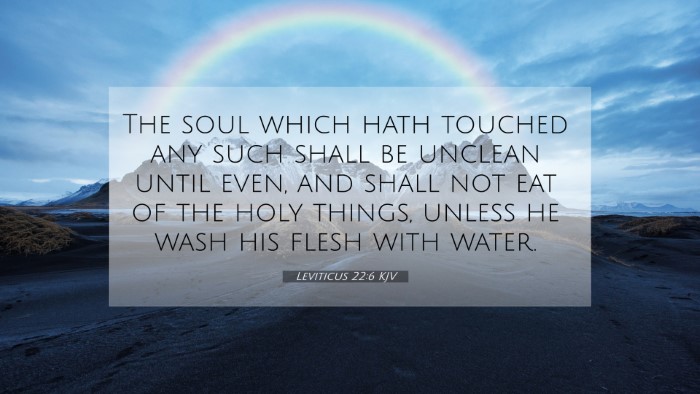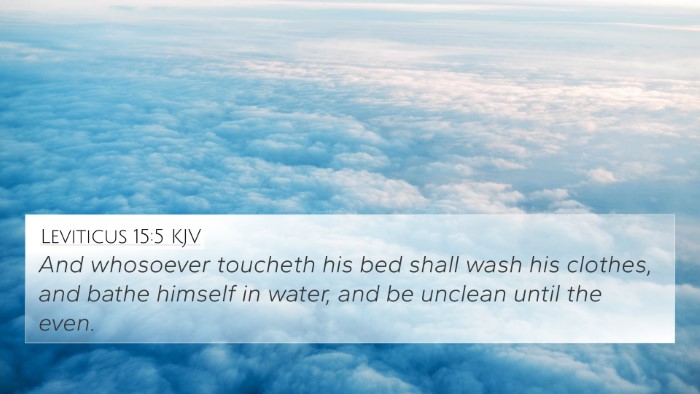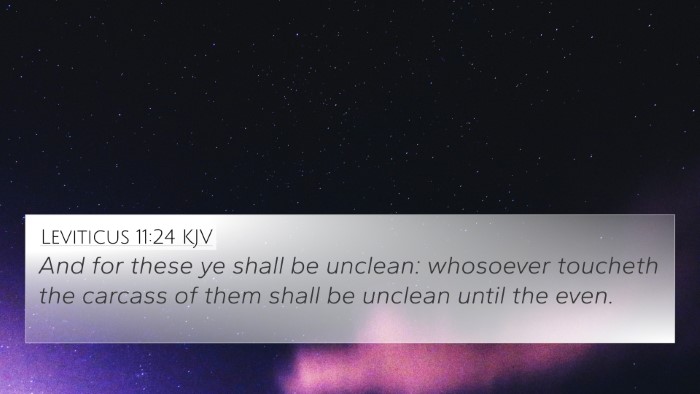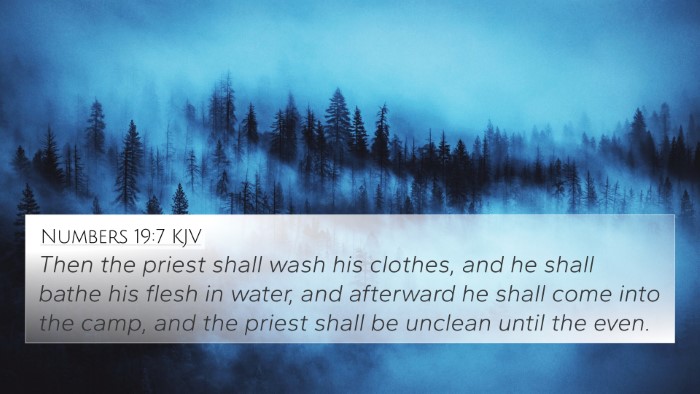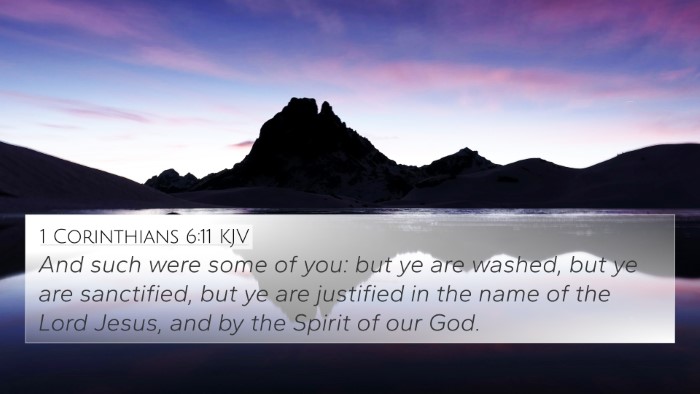Understanding Leviticus 22:6
Leviticus 22:6 states, "The soul which hath touched any such shall be unclean until even, and shall not eat of the holy things, unless he wash his flesh with water." This passage emphasizes the notion of ritual purity within the context of worship and service in the Old Testament.
Summary of Meaning
This verse highlights the consequences of touching ceremonial unclean things, which results in being unclean until evening. It reflects the broader theme of holiness in the priestly regulations, where God calls His people to purity, especially concerning sacred elements and practices.
Insights from Public Domain Commentaries
Matthew Henry's Commentary
Matthew Henry emphasizes that the laws regarding cleanliness serve as a means to maintain the sanctity of worship. He notes that touching unclean items rendered individuals temporarily unclean, which not only affected personal status but also their ability to participate in holy activities, in this case, consuming sacred offerings.
Albert Barnes' Notes
Albert Barnes elaborates that this ceremonial uncleanliness illustrates the principle that God requires His people to be distinct and separated from common impurities. The mention of washing signifies a necessary act for restoration to cleanliness and readiness to approach God. Barnes also connects this to the necessity for mental and spiritual preparation in worship.
Adam Clarke's Commentary
Adam Clarke underscores the importance of physical cleanliness as symbolic of spiritual purity. He interprets the act of washing as not merely a physical requirement but as an expression of an individual’s desire to be purified and restored to proper fellowship with God, inherent to the nature of the covenant relationship between God and His people.
Significance of Ritual Purity
The emphasis on ritual purity in Leviticus serves multiple purposes:
- Holiness of God: The statutes reflect God's incomparably holy nature and set a precedent for how the Israelites ought to approach worship.
- Community Standards: Collective adherence to purity laws promotes an understanding of shared responsibilities in maintaining communal holiness.
- Symbolism: The distinction between the clean and unclean represents deeper spiritual truths about sin, separation from God, and the need for atonement.
Bible Cross-References
Leviticus 22:6 can be cross-referenced with several other passages for a deeper understanding:
- Numbers 19:11-22 - Discusses the laws regarding touching dead bodies and the resulting uncleanness.
- Leviticus 11 - Outlines dietary laws and what animals are considered clean or unclean.
- Hebrews 9:13-14 - Connects the Old Testament idea of ritual cleanliness to the New Testament concept of cleansing through Christ’s sacrifice.
- 1 Peter 1:15-16 - Calls believers to be holy in all their conduct, referencing the call to holiness from Leviticus.
- Matthew 15:11 - Jesus clarifies that it is not what goes into a person that defiles them, but what comes out, highlighting the inner moral purity over ceremonial laws.
- Ephesians 5:26 - Talks about Christ cleansing His people, appealing to themes of purity and sanctification.
- Isaiah 52:11 - Encouragement to depart from unclean things and maintain holiness, resonating with this call to physical and spiritual cleanliness.
Conclusions on Connections Between Bible Verses
The provided cross-references illustrate the thematic links between Old and New Testament teachings. While Leviticus focuses on ceremonial laws critical to Israelite worship, the New Testament reveals their fulfillment in Christ, showcasing a fundamental shift from external rituals to internal transformation. This demonstrates the ever-relevant nature of the Scriptures in guiding believers' understanding of holiness and worship.
Tools for Bible Cross-Referencing
For those looking to engage in cross-referencing Bible verses, consider utilizing:
- Bible concordances for word-based search connections.
- Online Bible study tools that include cross-reference guides.
- Bible reference resources that provide thematic groupings of Scriptures.
- Comprehensive cross-reference materials that help in sermon preparation and personal study.
Further Study
To understand the implications of Leviticus 22:6 in relation to faith practices today, readers are encouraged to reflect on:
- How the principles of purity still apply in worship and daily living.
- The significance of internal purity over ritualistic practices.
- Connections with specific New Testament teachings that echo the themes established in Leviticus.
Engaging with the Word through cross-referencing can uncover rich narratives and deepen one's faith, providing a framework to interpret and apply Biblical truths in a contemporary setting.


